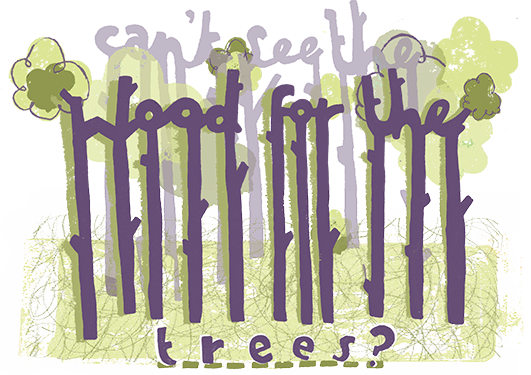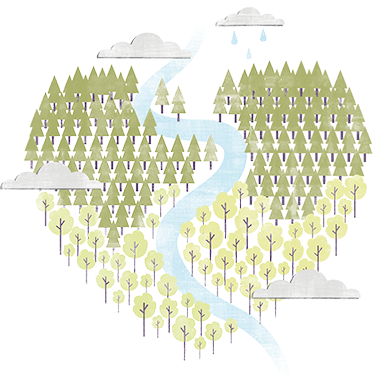Ready to bust some myths about paper? Part 2
THE MYTH:Paper is bad for the environment

THE FACT:
Paper is one of the few truly sustainable products
PAPER IS MADE FROM WOOD, A NATURAL RESOURCE THAT IS RENEWABLE, RECYCLABLE AND CAN BE MANAGED SUSTAINABLY.
"Besides easily recognizable paper products (e.g. writing paper or paper towels), more than 5,000 products can be made from recycled paper."
U.S. Environmental Protection Agency, 20161
In North America,
paper is recycled more than any other commodity and the benefits include:
extending the wood fiber supply;
reducing greenhouse gas emissions by avoiding methane emissions (released when paper decomposes in landfills or is incinerated);
contributing to carbon sequestration;
reducing energy needed for paper production; and
saving landfill space.1
These features, combined with the North American paper industry’s advocacy of responsible forestry practices,
certification, the
use of renewable biomass and advances in
efficient paper-making technology, make paper
one of the most sustainable products we use.
•
About 39% of the fiber used in paper-making in the U.S. is obtained through recycling. The rest comes from wood that is typically obtained through:
1) thinning of forest stands being grown to larger diameters to provide raw material for production of lumber and plywood2) patch clear-cutting of smaller diameter trees managed for pulp production, and/ or3) collection of chips and sawdust produced as by-products in the production of lumber.2
•
In Canada, 87% of the wood fiber used to make paper comes from a blend of sawmill residues (59%) and recycled paper (28%).3
•
The paper industry adheres to respected third-party certification standards, ensuring the paper you use has come from a sustainable forest source. These include the Forest Stewardship Council® (FSC®); the Sustainable Forestry Initiative® (SFI®) program; the American Tree Farm System (ATFS) and systems endorsed by the international Programme for the Endorsement of Forest Certification (PEFCTM).4
•
Globally, only about 10% of the world’s forests are certified – the majority of which are in North America. By sourcing certified products from a variety of credible standards, buyers are sending a message that they support sound forestry.5
•
Wood fibers can be grown, sourced and reused in a responsible way. Maximizing the use of recycled fibers and sourcing virgin fiber from credibly certified natural forests and plantations can reduce paper’s ecological footprint.”6
1 U.S. Environmental Protection Agency, 2016
2 Dovetail Partners, 2016
3 Forest Products Association of Canada, 2012
4 American Forest & Paper Association, 2014
5 Sustainable Forestry Initiative, 2013
6 World Wildlife Fund, 2015
This article was originally published by The international Two Sides network, and can be found here

THE FACT: IN NORTH AMERICA, WE GROW MANY MORE TREES THAN WE HARVEST THERE ARE 20% MORE TREES IN THE U.S. TODAY THAN THERE WERE ON THE FIRST EARTH DAY CELEBRATION IN 1970. ¹ "The reality is that the greatest incentive for continued investment and retention of our nation’s forests is a stable market for paper and other wood products." Dovetail Partners ² Paper manufacturers encourage forest sustainability through their purchase and use of certified wood fiber and by promoting sustainable forest management policies and practices at home and around the globe. By providing a dependable market for responsibly grown fiber, the paper industry encourages landowners to manage their forestland instead of selling it for development or other non-forest uses.², ³ • Net forest area in the U.S. has been stable since the early 1900’s and has increased from 754 to 766 million acres between 2005 and 2015 . Net volume of growing stock increased by over 10% between 2005 and 2015. 4 Canada’s forest area of 857 million acres has been quite stable over the past 25 years. 5 • Each year forests in the U.S. and Canada grow significantly more wood than is harvested. In the U.S., average net annual increase in growing-stock trees nationwide is about 26 billion ft³. 6 In 2015, Canada harvested just over 5.6 billion ft³ of timber, well below the estimated sustainable wood supply level of 7.98 billion ft³. 7 • Claims like “go paperless – save trees” create a false impression that forests are a finite resource, being destroyed . In truth, North American forests are a renewable resource that is continuously replenished using sustainable forest management. 8 • More than half the forest land in the U.S. is owned and managed by about 11 million private forest owners . Private forest lands provided over 90% of the domestically produced wood and paper products in 2017. • The income landowners receive for trees grown on their land encourages them to maintain, sustainably manage and renew this valuable resource . 9 • On privately owned timberlands, overall inventories increased 6.2% between 2008 and 2014 and forest growth exceeded harvest removals . 10 • Avoiding the use of wood is not the way to protect forests for the long term . It is precisely the areas of the world that consume the least wood that continue to experience the greatest forest loss. 8 1 American Forest & Paper Association, 2013 2 Dovetail Partners, 2016 3 World Wildlife Fund, 2015 4 United Nations FAO, 2015 5 Natural Resources Canada, 2017 6 Oswalt et al., 2014 7 Natural Resources Canada, 2017 8 Dovetail Partners, 2014 9 USDA, 2017 10 Forest2Market, 2016 This article was originally published by The international Two Sides network, and can be found here

For printing industry leader Hillview Design Print Media , the passion to help companies build their business is what fuels them. Being a successful print company since 1987, the staff of Hillview Design Print Media has seen it all from major economic challenges to unparalleled success in their business. Since 1987 , Hillview Design Print Media has purchased 8 printing businesses in all. It all started when current President Beth Walker was working for Rainbow Press in San Jose, California, in 1997. The previous owner decided to sell Rainbow Press. Beth, who had worked in printing all along, decided to take the plunge and buy the company. As with any new venture, the first year was slow, but only for a short while. The company grew from $187K the first year to over $400K within a short period. Beth invested in building strong relationships with her clients, rather than “just selling.” People came to her through word-of-mouth advertising. That set the ball rolling and she bought Hillview Printing in Milpitas in 2004 that almost doubled the size of Rainbow Press. She kept the Hillview Printing name. Beth was on a journey of becoming a printing conglomerate. She bought Murphy’s printing in 2005 when its owner approached her for the deal, she took over CC Graphics , Impress 2000 , Innovative Print Media in 2008-09, and Campbell Graphics in 2012. Most recently, Beth bought Norman Paul’s Print Center in Campbell in October 2017. “I am proud of my accomplishments,” said a beaming Beth. “We have come out of the 'bad economies' a little bruised but stronger than ever!” Beth is a philanthropist who believes in paving the way forward. She embodies cooperative networking. She has been a part of many groups and given her innate quality to help. She has won Local Member of the Year , National Member of the Year , and many Excellence Awards . But her most ‘prized’ award is the Spirit of Success Award by AT&T . She was the only one from the entire Western region that year to be handpicked for this prestigious award. Beth is currently involved in BNI Highrise group that meets weekly at the Silicon Valley Capital Club and is the Managing Director of the Morgan Hill / South County Polka Dot Powerhouse (a national women’s networking group). Beth takes the most pride in helping women entrepreneurs grow their businesses. Beth is a great mentor and if you have questions about building your own business or buying out another company, feel free to invite her for coffee! Beth is more than willing to share some robust insights. Beth's resilience, business acumen, and compassion will definitely redefine how you do business. The future of Hillview Design Print Media is bright. Since our humble beginnings when Beth purchased Rainbow Press, Hillview Design Print Media has grown by over 800% and continues to climb. In an era of diminishing customer experience and service, Hillview Design Print Media goes above and beyond by treating our clients like family. Hillview Design Print Media is the only family-owned print company in the Bay Area that utilizes an unrivaled 5 step process for commercial printing and promotional products. We call it “The Hillview Way”



